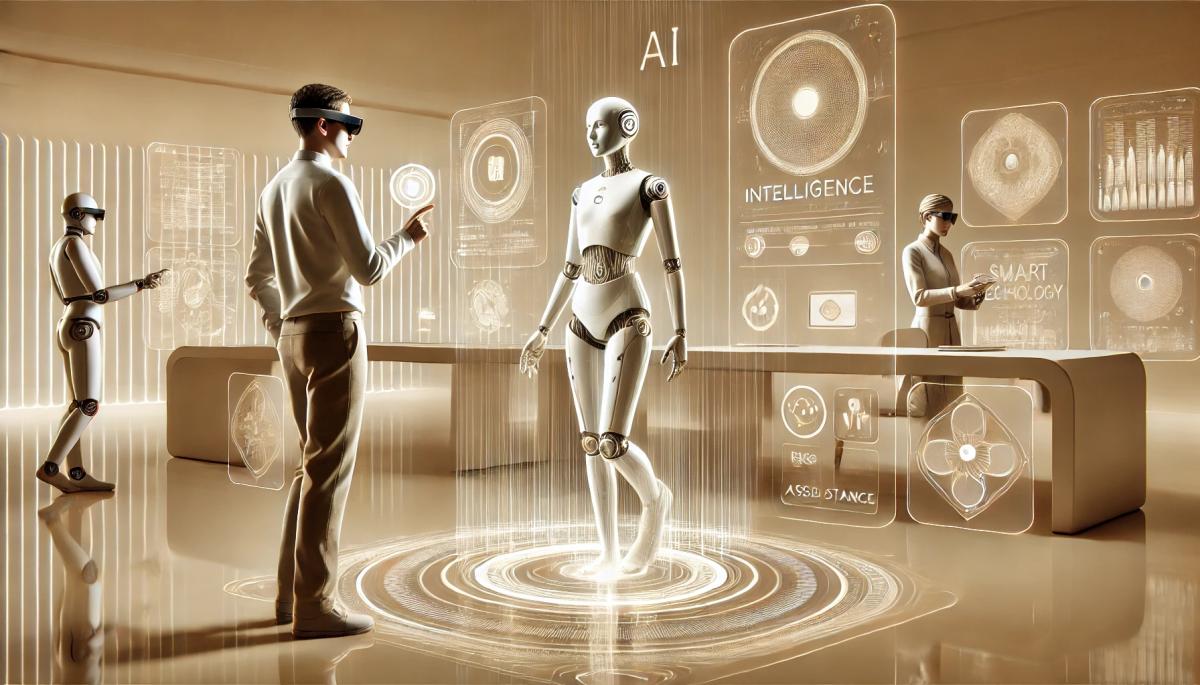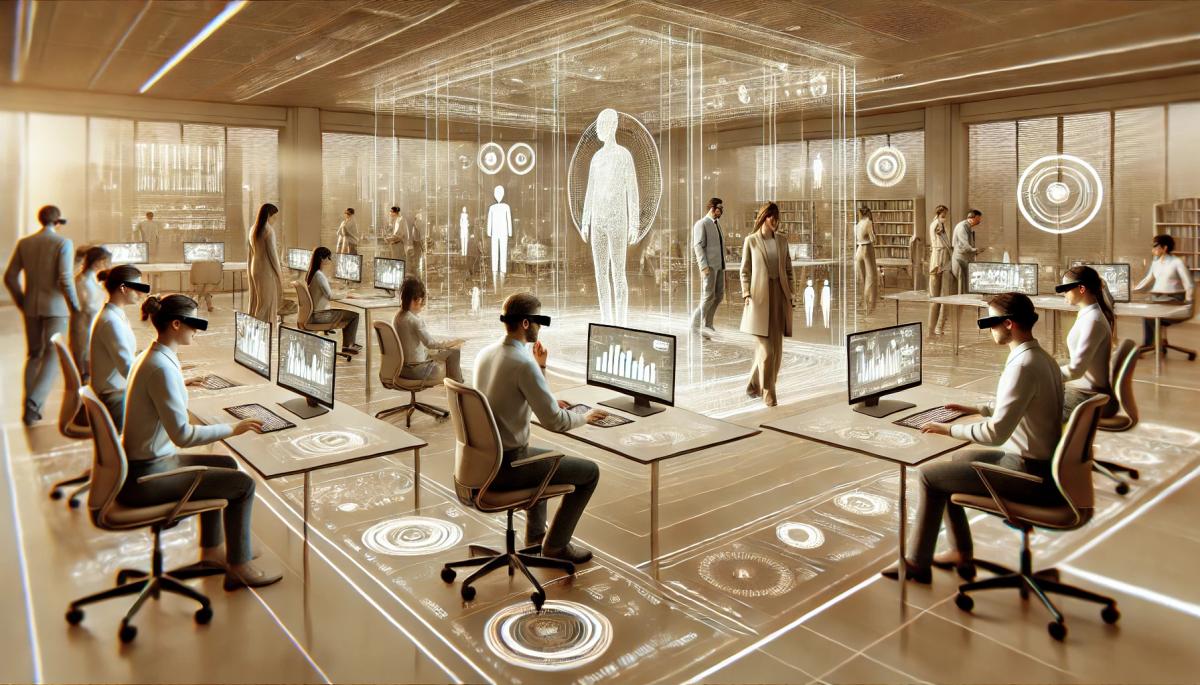Do you want to know what awaits us in 2050? Forget flying cars, the real revolution will happen online. Artificial intelligence will advise us on what to wear, smart homes will take care of shopping, and in virtual reality, we will have coffee with a friend from across the world.

We live in an era of technological revolution, which continuously brings new discoveries. That is why some predict that our world will look like a true sci-fi movie in a few years. But is this really the case? Join us as we explore where, according to some experts and scientists, we might be heading by 2050.
Ubiquitous artificial intelligence
Our daily lives will likely depend on artificial intelligence. Instead of single-use applications or smart assistants as we know them today, AI will become a universal guide, recognizing our moods, needs, and even predicting our desires.
Thanks to advanced machine learning, artificial intelligence will be able to provide tailored advice in areas such as education, healthcare, and personal finance. However, it will also bring many ethical questions, including how to ensure it respects users' privacy and does not jeopardize their safety.
This will also lead to an increase in legal disputes, prompting governments worldwide to introduce new legislation and regulations.
The internet of things on an entirely new level
The Internet of Things (IoT), or the interconnection of physical devices and systems via the internet, will experience tremendous growth by 2050. Imagine cities where everything from transportation systems to home appliances is connected and automated.
Smart homes will become the standard, with your house responding to your wishes and needs without you having to do anything. Your refrigerator will automatically order groceries, lighting will adjust to your mood, and your mirror will offer lifestyle recommendations based on your health analysis.

Virtual and augmented reality
With the further development of virtual (VR) and augmented reality (AR), the line between the digital and real world will blur even more. People will be able to enter entirely different realities through VR and AR or enrich their everyday reality with digital elements.
Work, education, and social interactions will move into the virtual space, where people will meet, have fun, and collaborate regardless of distance. We might be heading towards a time when even personal doctor visits or business meetings take place in the digital realm, using realistic avatars in environments that perfectly mimic the real world.
Blockchain and data security
Blockchain technology has the potential to significantly affect the security and transparency of the online world. It is expected that by 2050, blockchain systems will be the foundation of all digital transactions, contracts, and identities.
This technology will enable more secure and transparent data processing, which could reduce cyber threats and fraud. The future of blockchain might also include decentralized social networks and applications, where each user controls their data without relying on central servers.
Digital economy and the future of work
Work in 2050 will look completely different from today. With the rapid rise of automation and AI, many current professions will become a thing of the past. However, the digital economy will offer new opportunities and job roles that we don't even know about today.
Traditional office environments will be replaced by virtual offices, where people work through VR headsets. Flexibility of work and new forms of digital skills will become crucial aspects.
The form of education will also change, being more focused on technology, data, and creativity. Instead of traditional studies, there will be a growing demand for online courses, allowing people to change jobs within months without studying for years.

Advanced personalization and digital identity
Digital identity and personalization will reach new levels. Thanks to advanced data analysis and machine learning, applications and services will be tailored to the specific needs and preferences of users.
By 2050, every user will have a unique digital "signature" that will accompany them across all digital services, from social networks to banking services. However, digital identity will also raise questions about privacy and security, leading to a higher demand for technologies that protect privacy.
Interactive entertainment and games
Online entertainment and the gaming industry will undergo significant transformation. Games in 2050 will offer realistic virtual worlds that respond to every player’s movement and gesture. Virtual concerts, festivals, and interactive shows will bring entertainment directly to viewers in the form of a fully immersive digital experience.
With advancements in VR and AR, it will be possible to literally step into the story of movies and series, becoming the main character and influencing the plot. Entertainment in 2050 will be a completely different experience than we know today.
The online world in 2050 promises amazing possibilities and innovations that will change our daily lives. From artificial intelligence to virtual reality, technologies will connect people across continents, provide personalized services, and offer new forms of entertainment. However, the future will also bring many challenges, especially in the area of security and ethics.
RoboMind: Teach kids to program robots

RoboMind is an educational tool designed to teach the basics of programming using a virtual robot. It uses the simple Robo programming language, which is an ideal choice for beginners. Students learn algorithmic thinking through practical tasks such as navigating mazes or manipulating objects.
OpenAI chief shocks: wants superintelligent AI in a few years

Sam Altman, CEO of OpenAI, announced that the company already knows how to create general artificial intelligence and is aiming for the development of superintelligence. According to his prediction, it could become a reality in just a few years. Although current AI systems still have significant shortcomings, Altman believes in their rapid overcoming.
Minecraft: Education Edition: teach kids programming with a popular game

Minecraft: Education Edition connects the popular gaming world with education. Kids can explore programming, collaborate on problem-solving, and learn new skills in a familiar, creative setting. How does it work and is it suitable for younger children?
Alice: a creative journey into programming and 3D creation

Alice is an educational platform that allows children and students to delve into the world of programming through creating 3D animations, interactive stories, and simple games. It is suitable for both schoolchildren and university users. What does it offer and how does it work?
American government vs. TP-Link: Will the ban on routers and other devices pass?

The American government has launched an investigation into the Chinese company TP-Link, which controls 65% of the router market. The reason is national security concerns following the use of their devices in ransomware attacks.
OpenAI unveiled the revolutionary model o3. But we'll have to wait for the launch

OpenAI concluded its Christmas event "12 Days of OpenAI" by announcing the revolutionary model o3 and its smaller version o3-mini. The new model promises significant improvements in reasoning and solving complex tasks. For now, it will only be available to safety researchers.